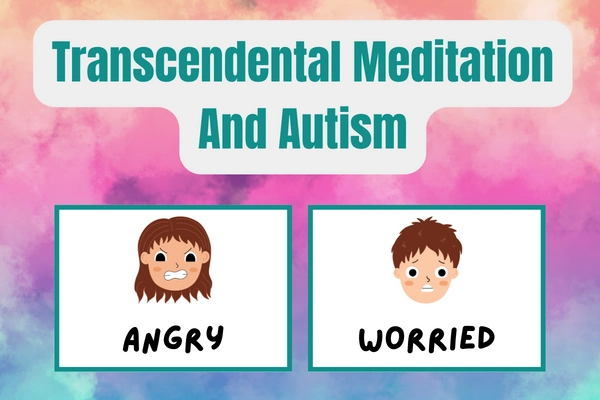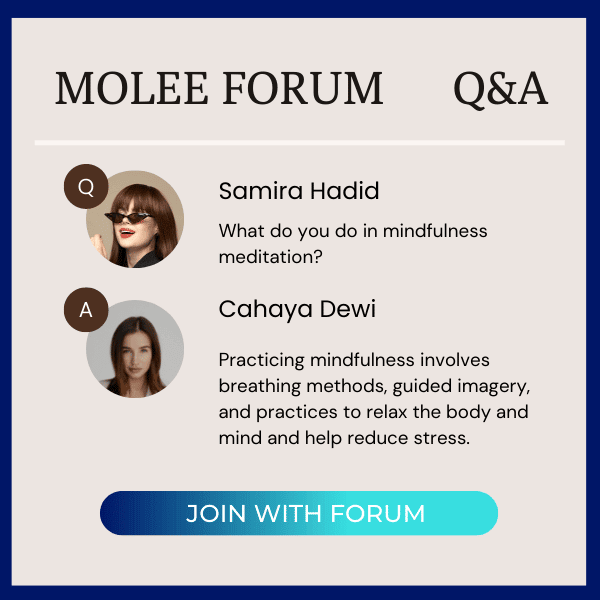Table of Contents
- Understanding Autism
- The Connection between Autism and Stress
- Transcendental Meditation
- Transcendental Meditation and Autism: The Potential Benefits
- Transcendental Meditation as a Tool for Autism
- Meditation Techniques Tailored for Autism
- Clinical Studies and Scientific Research Reports
- Exploring Daily Activities for Autism with Meditation
- Conclusion
- FAQs on Transcendental Meditation and Autism
- How does transcendental meditation impact brain functioning in individuals with autism?
- Is there any evidence supporting the use of transcendental meditation in children with autism spectrum disorders?
- Can transcendental meditation be helpful for veterans with posttraumatic stress disorder?
- Are there any studies on the impact of transcendental meditation on mood and cardiovascular health?
- What are the potential benefits of yogic meditation techniques for patients with autism?
- Is there a connection between transcendental meditation and the response to stress in children with autism?
- Can transcendental meditation prevent or decrease the severity of symptoms in children and adolescents with autism?
- Is there any scientific evidence supporting the use of mindfulness meditation in the treatment of autism?
- What is the significance of controlled trials on the efficacy of meditation techniques for individuals with autism?
Are you or someone you know affected by autism? Finding effective ways to manage the symptoms and improve overall well-being can be a challenging journey.
In this article, we step into the fascinating world of transcendental meditation and its potential impact on individuals with autism. By exploring the intersection of these two subjects, we aim to shed light on the benefits of incorporating transcendental meditation into the lives of those impacted by autism.
Whether you’re a caregiver, a family member, or an individual living with autism, understanding how this ancient practice can offer a sense of calm and balance may provide valuable insights.
Join us as we uncover the hidden connection between transcendental meditation and autism.
Key Takeaways
- Transcendental Meditation may be a useful tool for reducing stress and improving the quality of life for individuals with Autism Spectrum Disorder (ASD).
- Three different types of Autism has been identified and each person affecting from Autism shows different symptoms than others.
- The number of people are suffering from Autism are rising and different treatments for autism needs to be explored.
Understanding Autism
Autism is a chronic neuro developmental disorder that affects communication, social interaction, and behavior that typically appears during the first three years of life. Autism is more common in boys than girls. The exact cause of autism is unknown, but it is believed to be a combination of genetic and environmental factors.
Read our full article on transcendental meditation and depression.
Statistics of Autism
These updated stats are taken from the Centers for Disease control and Prevention (CDC)
- Approximately 1 in 36 children has been identified with autism spectrum disorder (ASD) based on estimates from the CDC’s Autism and Developmental Disabilities Monitoring (ADDM) Network.
- ASD is found to occur in all racial, ethnic, and socioeconomic groups.
- ASD is nearly 4 times more common among boys than among girls.
- A study conducted from 2009 to 2017, as reported by parents, indicated that about 1 in 6 (17%) children aged 3–17 years were diagnosed with a developmental disability, which included autism, attention-deficit/hyperactivity disorder, blindness, and cerebral palsy, among others.
Prevalence of Autism Spectrum

Different types of Autism
There are three different types of autism: Autistic Disorder, Asperger’s Syndrome, and Pervasive Developmental Disorder-Not Otherwise Specified (PDD-NOS).
Autistic Disorder is the most severe form of autism and is characterized by significant impairments in communication and social interaction.
Asperger’s Syndrome is a milder form of autism and is characterized by difficulties in social interaction and restricted interests.
PDD-NOS is a diagnosis given to individuals who do not meet the criteria for Autistic Disorder or Asperger’s Syndrome, but still have significant impairments in communication and social interaction.
Autism Spectrum Disorder (ASD)
Autism Spectrum Disorder (ASD) is a group of neurodevelopmental disorders that includes Autistic Disorder, Asperger’s Syndrome, and PDD-NOS. ASD is characterized by difficulties in communication and social interaction, as well as restricted and repetitive behaviors.
Children with ASD may have difficulty making eye contact, using gestures to communicate, and understanding nonverbal cues. They may also have restricted interests and engage in repetitive behaviors, such as hand-flapping or lining up objects.
Symptoms of Autism and Different Levels
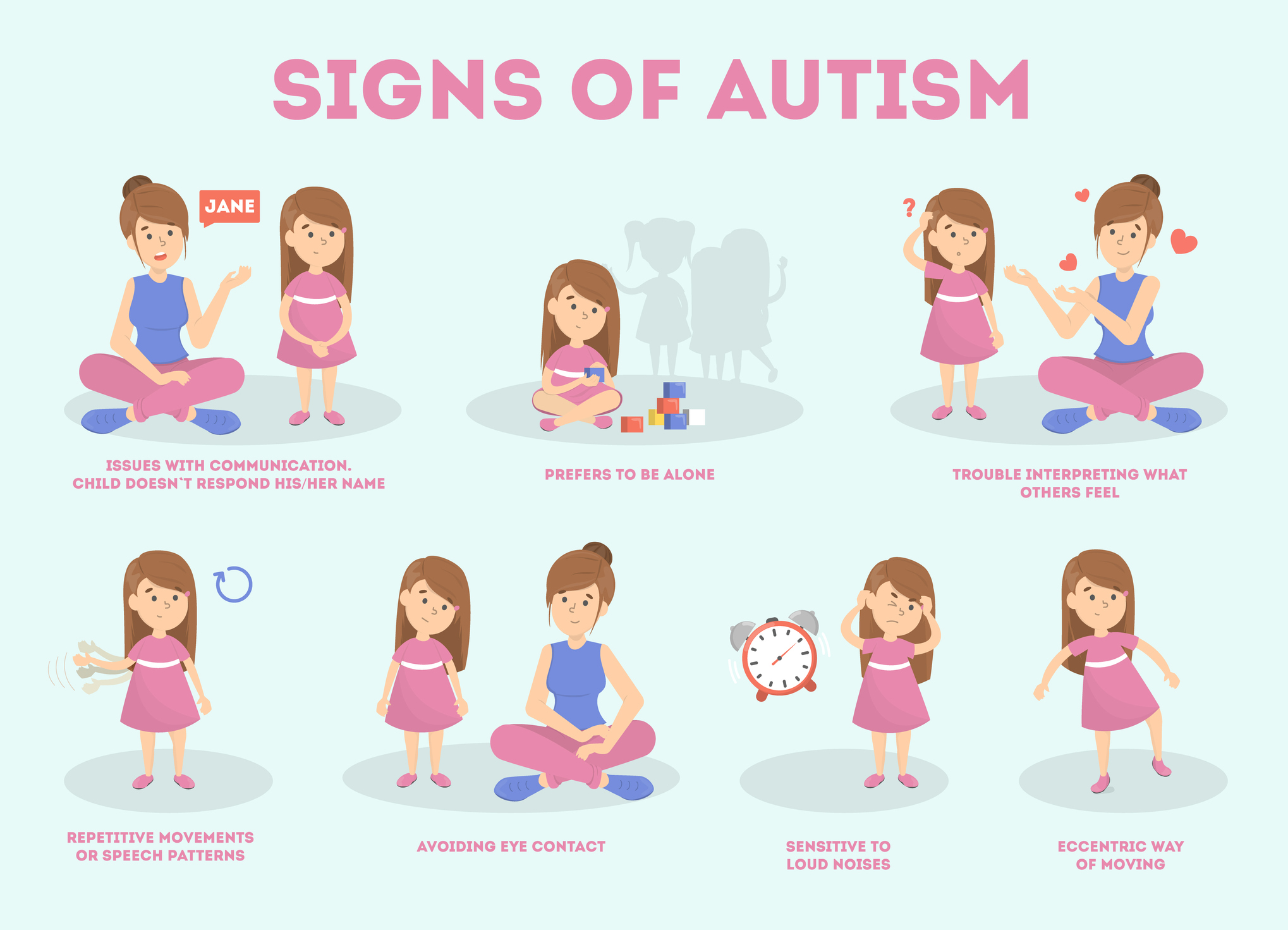
The image take from Integrity Inc org.
The Connection between Autism and Stress
The connection between autism and stress is complex and multifaceted. People with ASD often experience high levels of stress, anxiety, and sensory overload, which can exacerbate their symptoms and negatively impact their quality of life.
Chronic stress is a common occurrence in individuals with ASD, as they may have difficulty coping with changes in routine, social situations, and sensory stimuli.
This can lead to a variety of physical and emotional symptoms, including fatigue, irritability, and difficulty concentrating. Furthermore, There is a more possibility to developing Post-Traumatic Stress Disorder (PTSD) due to their heightened sensitivity to stress and anxiety.
The stress response in individuals with ASD may be different than in neurotypical individuals. Research has shown that they have a dysregulated stress response, which may contribute to their susceptibility to chronic stress and anxiety.
This dysfunction in autism spectrum disorders may also make it more difficult for them to cope with stress and anxiety.
Transcendental Meditation (TM) has been suggested as a potential avenue for managing stress and anxiety for autism. We will discuss the findings of autism research in the later part of the article.
Transcendental Meditation

Transcendental Meditation (TM) is a technique that involves the use of a mantra, which is a sound or phrase, to help the practitioner achieve a state of deep relaxation and mental clarity. It is a type of meditation that is based on yogic principles and is often referred to as mantra-based meditation.
The technique of TM involves sitting comfortably with eyes closed, and silently repeating a mantra for 20 minutes, twice a day. The mantra is chosen by the practitioner and is kept private. The technique is simple and easy to learn, and does not require any special equipment or training.
One of the key benefits of TM is its ability to reduce stress and anxiety. Studies have shown that regular practice of TM can lead to a reduction in cortisol, the stress hormone, and an increase in serotonin, the feel-good hormone. This can lead to a greater sense of well-being and a more positive outlook on life.
TM has also been shown to have a positive impact on brain function. Studies have found that regular practice of TM can lead to increased activity in the prefrontal cortex, the part of the brain responsible for decision-making, attention, and impulse control. This can lead to improved focus, concentration, and cognitive function.
Transcendental Meditation and Autism: The Potential Benefits
TM has been suggested that TM may be helpful for children with autism and young adults with autism spectrum disorders (ASDs). In this section, we will explore the potential benefits of TM for individuals with ASDs.
- Reduced Stress and Anxiety: Transcendental meditation has been shown to help people with autism reduce stress and anxiety levels, promoting a sense of calm and emotional well-being.
- Improved Focus and Attention: Practicing transcendental meditation may enhance the ability to focus and sustain attention, potentially aiding in cognitive tasks and daily activities.
- Enhanced Emotional Regulation: Transcendental meditation can support for regulating their emotions, leading to improved emotional resilience and coping mechanisms.
- Better Sleep Patterns: Engaging in transcendental meditation may contribute to improved sleep quality, potentially alleviating sleep-related challenges often experienced in this population.
- Overall Well-being: Incorporating transcendental meditation into the lives of individuals with autism may contribute to an overall sense of well-being, promoting relaxation, self-awareness, and potentially reducing behavioral challenges.
Is meditation good for people with autism?
Meditation, including TM, has been found to have potential benefits for people suffering from Autism. Meditation can help with self-regulation and self-control, which are important skills for persons who may struggle with impulsivity and emotional regulation.
Additionally, meditation has been found to improve cognitive functioning, including attention, memory, and executive functioning.
What are calming activities for autism?
Persons may benefit from calming activities, including sensory activities such as deep pressure, weighted blankets, and calming music. These activities can help with emotional and physical well-being, as well as promote greater relaxation. TM has been found to be a calming activity that can facilitate expression and promote happiness.
What is the behavior of adolescents with autism spectrum disorder ?
Adolescents with autism spectrum disorder (ASD) may exhibit a wide range of behaviors, including challenges with social interaction, communication difficulties, repetitive behaviors, and intense interests in specific topics.
Additionally, they may experience sensory sensitivities and struggle with changes in routine. Each individual with ASD is unique, and their behaviors can vary widely in terms of severity and presentation.
Transcendental Meditation as a Tool for Autism
Transcendental Meditation (TM) has been used as a potential therapy for managing stress and anxiety that affects autism spectrum disorders. Transcendental meditation technique is a simple and easy-to-learn technique that can be practiced for 20 minutes twice a day.
Transcendental Meditation for Autism Adults
Anecdotal reports suggest that TM may be helpful for some adults with autism spectrum disorders. A retrospective case series of six adults with ASD explored the use of TM as a potential avenue for managing the stress and anxiety that affects an estimated 40% of those with ASDs. The results showed that transcendental meditation program prevents the increase in anxiety and stress levels significantly among the participants.
Transcendental Meditation for Autism Children
TM has also been found to be helpful for children with ASDs.In his acclaimed book, “Transcendence: Healing and Transformation Through Transcendental Meditation,” Dr. Norman Rosenthal conducted interviews with numerous young individuals with ASDs who had adopted TM, along with their parents.
Within the book, he explored the potential impact of the TM program for individuals with ASDs. TM has been found to improve social behavior and social interaction among children with ASDs.
Understanding the Autism Grief Cycle and TM
Parents of children with ASDs often go through a grief cycle, which includes denial, anger, bargaining, depression, and acceptance . TM can help parents cope with the emotional stress of raising a child with ASDs. It can also help parents improve their own mental health and well-being, which can have a positive impact on their child’s behavior and development.
In conclusion, Transcendental meditation program is a simple and easy-to-learn technique that can be used as a tool for managing stress and anxiety. It has been found to improve social behavior, social interaction, and reduce anxiety and stress levels. The effects of the transcendental meditation can also be used as a therapy for parents of children with ASDs to help them cope with the emotional stress of raising a child with ASDs.
Best Book Describes the Effects of Transcendental Meditation for Autism
Dr. Norman Rosenthal’s book “Transcendence: Healing and Transformation through Transcendental Meditation” includes his experiences with young children with ASD. Here is an excerpt from his book.
“Although the prevalence of ASD has been estimated as only 1 per 88, this statistic doesn’t reflect the huge toll that the condition takes on the individuals with the problem and their families. It is a lifelong disorder, with no definitive cure, which requires extensive and expensive care and help for decades.”
You can buy this bestselling book for more details.
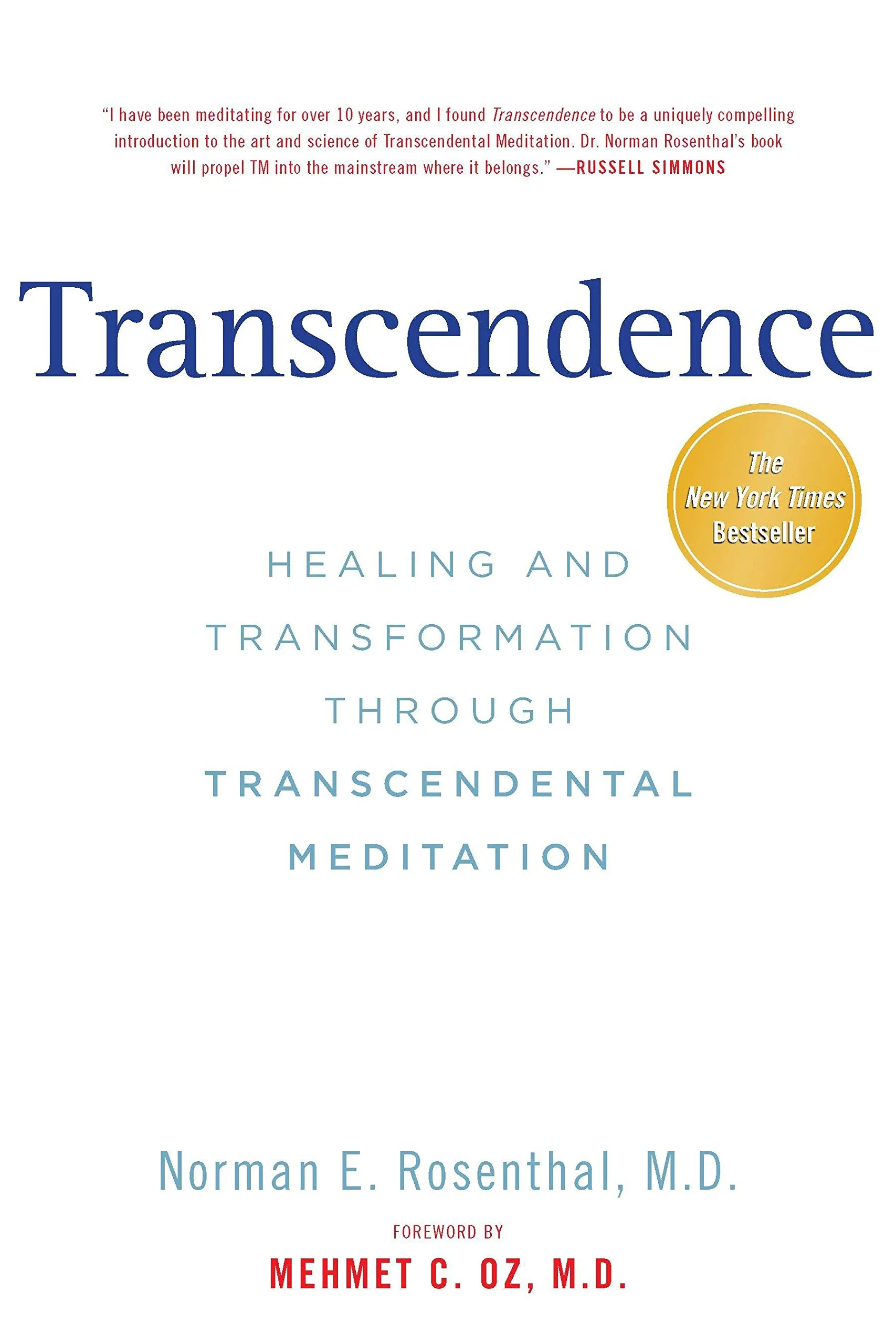
Transcendence: Healing and Transformation through Transcendental Meditation
- from Dr. Norman Rosenthal
Meditation Techniques Tailored for Autism
Transcendental Meditation (TM) has shown to be a promising technique for people with Autism Spectrum Disorders. It involves the use of a mantra, a sound or phrase, that is repeated silently. However, someone may find it difficult to focus on the mantra. Therefore, there are other meditation techniques that can be tailored to their needs.
Guided meditation script for autism
Guided meditation is a technique that involves a narrator who guides the listener through a series of visualizations and relaxation exercises. This technique can be particularly helpful as it provides structure and guidance. A guided meditation script for autism can include prompts such as “imagine a peaceful place” or “imagine a warm light surrounding you”. These prompts can help to focus their attention and reduce anxiety.
Autism meditation music
Music can be a powerful tool for relaxation and stress reduction. Autism meditation music is specifically designed to be calming and soothing for. It can include sounds of nature, such as ocean waves or bird songs, as well as instrumental music. The rhythm and melody of the music can aid to regulate their breathing and reduce stress.
Mindfulness activities for adults with autism
Mindfulness is a technique that involves being present in the moment and paying attention to one’s thoughts and feelings without judgment. It can be particularly helpful for adults with ASD as it can improve emotional regulation and reduce stress. Mindfulness activities for adults with autism can include breathing exercises, body scans, and mindful walking. These activities can be done individually or in a group setting.
In conclusion, there are various meditation techniques that provides a support for persons suffering from ASD. Guided meditation, autism meditation music, and mindfulness activities can all be effective tools for reducing stress and improving emotional regulation. It is important to find a technique that works best for each individual and to practice it regularly for optimal benefits.
Clinical Studies and Scientific Research Reports
Transcendental Meditation (TM) has been the subject of numerous clinical studies and anecdotal reports for its potential benefits in treating for Autism Spectrum Disorder (ASD). While there is still much to be learned about the relationship between TM and ASD, there is increasing evidence to suggest that TM may be helpful in alleviating some of the clinical symptoms associated with the disorder.
1. Transcendental meditation for autism spectrum disorders? A perspective
Findings of the study[1]:
- Anecdotal reports suggest Transcendental Meditation (TM) may help some children and young adults with autism spectrum disorders (ASDs)
- The rates of autism are rapidly rising, affecting 1 in 68 children
- Up to 40% of people with ASDs are further afflicted by anxiety
- Effective treatments for ASDs and anxiety are lacking
- Anecdotal instances of individuals with ASDs benefiting from TM have been reported
- TM is known to reduce anxiety, which may help Autism.
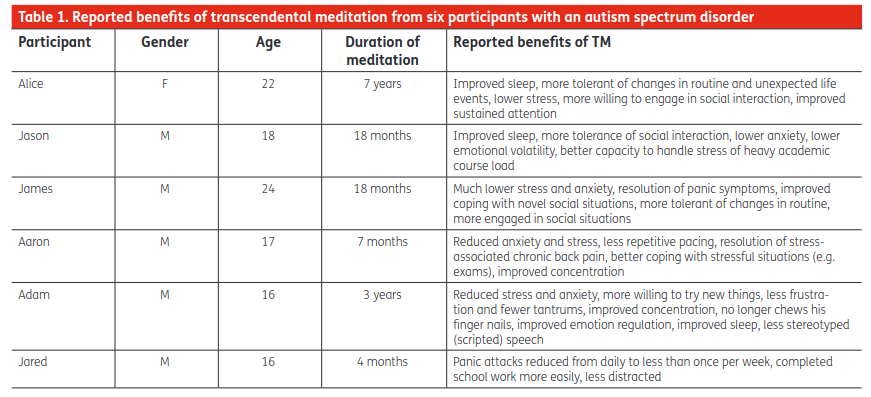
2. Meditation as a Potential Therapy for Autism: A Review
This study[2] explore the different outcomes of the practice of meditation fro the Autism and here are summary of findings.
- Meditation can help collect and silence dispersed thoughts, disharmonious feelings, and destructive behaviors.
- Chronic stress can lead to genetic mutations and various pathologies.
- During meditation, restorative mechanisms of the body are strengthened, resulting in a feeling of well-being.
- Chanting mantra can induce meditative states and pure consciousness.
- Mantras can synchronize respiratory signals, cardiovascular rhythms, and cerebral blood flow.
- Meditation may complement a balanced lifestyle and strengthen self-control and character development.
- Mantra meditation may be useful for young children and improve health outcomes.
References:
- David O. Black & Norman Rosenthal | Peter Walla (2015) Transcendental meditation for autism spectrum disorders? A perspective, Cogent Psychology, 2:1, DOI: 10.1080/23311908.2015.1071028
- Sequeira S, Ahmed M. Meditation as a potential therapy for autism: a review. Autism Res Treat. 2012;2012:835847. doi: 10.1155/2012/835847. Epub 2012 Jun 4. PMID: 22937260; PMCID: PMC3420737.
Exploring Daily Activities for Autism with Meditation

Integrating Transcendental Meditation (TM) into daily routines and activities can be an effective way to help to manage stress and anxiety. Transcendental meditation practice is a non-invasive practice that helps people and families with autism.
One way to incorporate TM into daily activities is to practice it during transitions. For example, before starting a new activity, an individual with ASD can take a few minutes to practice TM to help them transition smoothly. Practicing TM during transitions can help reduce anxiety and stress, which are common triggers for individuals with ASD.
Another way to incorporate TM into daily activities is to practice it during meal times. Practicing TM before meals can help them relax and be more mindful of their food. This can help them enjoy their meals more and reduce the likelihood of overeating or undereating.
Finally, practicing TM before bedtime helps to fall asleep more easily and have a more restful sleep. This can help improve their overall mood and behavior during the day.
Read our article on TM and sleep to master your sleep cycle.
Conclusion
In conclusion, the anecdotal reports and experiences shared in this article suggest that Transcendental Meditation (TM) may hold potential benefits for people with autism spectrum disorders (ASDs). The observed positive outcomes, particularly in reducing anxiety and promoting well-being, indicate the need for further research and clinical trials to explore the efficacy of TM as a complementary intervention for individuals with ASDs.
Additionally, the promising results highlighted in Dr. Norman Rosenthal’s book “Transcendence: Healing and Transformation through Transcendental Meditation” underscore the importance of continued investigation into the potential therapeutic effects of TM for individuals with ASD, offering hope for new approaches to support their well-being and quality of life.
As the rates of autism continue to rise and effective treatments remain elusive, the exploration of alternative interventions such as TM presents an opportunity to address the complex needs of people with autism.
With ongoing research and clinical trials, there is potential for TM to emerge as a valuable addition to the treatment and support options available for autism spectrum disorders, offering the possibility of improved outcomes and enhanced quality of life.
It is imperative that future studies delve deeper into the mechanisms through which TM may benefit individuals with ASDs, paving the way for the development of evidence-based interventions that can positively impact the lives of those affected by autism.
FAQs on Transcendental Meditation and Autism
How does transcendental meditation impact brain functioning in individuals with autism?
Studies have shown that regular practice of transcendental meditation may positively influence brain functioning in individuals with autism, potentially leading to improvements in cognitive abilities and emotional regulation.
Is there any evidence supporting the use of transcendental meditation in children with autism spectrum disorders?
Research findings indicate that transcendental meditation may offer benefits to children with autism spectrum disorders, particularly in reducing stress response and promoting overall well-being.
Can transcendental meditation be helpful for veterans with posttraumatic stress disorder?
There is growing evidence to suggest that transcendental meditation can be beneficial for veterans experiencing post traumatic stress disorder, offering a non-invasive method to cope with the effects of trauma and promote mental well-being.
Are there any studies on the impact of transcendental meditation on mood and cardiovascular health?
Research has explored the potential effects of transcendental meditation on mood and cardiovascular health, with preliminary findings indicating positive outcomes in terms of emotional well-being and cardiovascular function.
What are the potential benefits of yogic meditation techniques for patients with autism?
Preliminary studies have suggested that yogic meditation techniques may hold promise in improving the well-being of patients with autism, potentially contributing to enhanced emotional regulation and reduced stress levels.
Is there a connection between transcendental meditation and the response to stress in children with autism?
Research has indicated that transcendental meditation may help modulate the stress response in children with autism, potentially assisting in managing anxiety and promoting a sense of calm and relaxation.
Can transcendental meditation prevent or decrease the severity of symptoms in children and adolescents with autism?
While further research is needed, preliminary evidence suggests that transcendental meditation may have a preventive and ameliorative impact on symptoms experienced by children and adolescents with autism, potentially contributing to enhanced well-being.
Is there any scientific evidence supporting the use of mindfulness meditation in the treatment of autism?
Studies have explored the potential of mindfulness meditation as a complementary approach in the treatment of autism, with initial findings suggesting possible benefits in mood regulation and stress management for individuals on the autistic spectrum.
What is the significance of controlled trials on the efficacy of meditation techniques for individuals with autism?
Rigorous controlled trials play a crucial role in providing empirical evidence regarding the efficacy of meditation techniques for individuals with autism, informing potential integrative approaches to support their holistic well-being.


